FAQs

The Basics
The PST will be reinstated effective April 1, 2013.
British Columbia’s provincial sales tax (PST) will be re-implemented effective April 1, 2013 at a general tax rate of seven per cent.
The PST will apply to the same goods and services that were subject to PST prior to the implementation of the HST. All permanent PST exemptions will be re-implemented with the new PST, including
- all food for human consumption (e.g. basic groceries and prepared food such as restaurant meals);
- most services (e.g. personal services such as haircuts, dry cleaning, funeral services);
- admissions and memberships;
- bicycles;
- newspapers and magazines; and
- all permanent PST exemptions for business.
The re-implemented PST, like the previous PST, will be a retail sales tax that is payable when a taxable good or service is acquired for personal use or business use, unless a specific exemption applies. PST generally applies to:
- the purchase or lease of new or used goods;
- goods brought into BC for use in BC;
- the purchase of most services to goods (for example, vehicle maintenance, furniture assembly, computer repair);
- the purchase of telecommunication services including internet access, non-basic cable, non-residential telephone services, cell phone use, satellite services and facsimile services; and
- the purchase of legal services.
Read more about the Province’s plan to return to PST.
Transition Back From HST
Changing a province’s tax system is a complex undertaking for both business and government. There are a series of steps that need to be taken, and as the HST Independent Panel report stated, going back to the PST will take 18-24 months.
With harmonization, B.C. was really just eliminating one tax, the PST, and changing the rate of an existing tax that businesses were already familiar with. While there are some minor differences, like the point of sale rebates, basically the HST was just the GST at a higher rate (i.e., 12 percent HST instead of 5 percent GST).
Re-implementing the PST is not just changing the rate of an existing tax. The PST will be a second sales tax with its own set of rules and procedures that are separate from and in addition to those that businesses have to follow for the GST.
The Province needs to develop complex transitional rules in consultation with the federal government, rewrite provincial tax laws and regulations, and rebuild its capacity to administer the PST.
Businesses will need to readjust their accounting and administrative systems to prepare for collecting a second sales tax.
The Province has concluded an agreement with the Government of Canada for the repayment of the $1.6 billion in transition funding it received when B.C. moved to the HST.
Under the new agreement, the Province will have five years to repay in full the transition funding, and Canada has agreed to waive any interest charges over this period. The extended repayment schedule will save the Province debt interest costs that would otherwise have been incurred had the Province been required to repay the full amount right away.
Transitional Rules
When B.C. harmonized, there were detailed transition rules. Transition rules for the re-implementation of the PST are currently being developed. The Province continues to work on transitional rules both for the housing sector and more generally. This website will be updated with information about housing transition rules as soon as they are released.
Housing Transitional Rules have been released and can be found here.
PST Impacted Decisions
As part of HST implementation, the basic personal amount tax credit was increased. This enhancement will be reversed with the re-implementation of the PST on April 1, 2013.
No. The $230 B.C. HST credit will be replaced with the $75 PST credit when the PST is re-implemented.
The tax on private sales of vehicles, boats and aircraft will continue at a rate of 12 per cent. These sales are not subject to GST. The 12 per cent provincial tax rate ensures similar tax treatment between private sales and sales by GST registered businesses. Sales of vehicles, boats and aircraft will be subject to either PST or the tax on private sales, not both.
The PST rate of 10 per cent on liquor will be reinstated with the re-implementation of the PST. Liquor mark-ups will be reduced to their pre-HST levels to generally keep shelf prices constant.
With the re-implementation of the PST, the provincial portion of the HST on tobacco products will be eliminated. To offset this reduction, tobacco tax rates will be adjusted to generally keep the overall tax on tobacco constant.
PST Re-Implementation and Other Taxes
The tax on propane will be re-implemented at the same time as the PST. The tax rate will be 2.7 cents per litre, the same rate as prior to the implementation of the HST.
The tax on short term accommodation (formerly the provincial Hotel Room Tax) will be re-implemented at the same time as the PST. The tax rate will be 8 per cent, the same rate as prior to harmonization, and tax will apply in the same way it did prior to the HST.
Yes, it will continue.
The British Columbia Resort Municipality Initiative provided eligible resort municipalities with a portion of the provincial hotel room tax. When the hotel room tax was eliminated with the introduction of the HST, funding for resort municipalities was continued. Provincial government funding for eligible resort municipalities will continue with the re-implementation of the PST.
Surtaxes, Levies, Special Rates Under the PST
The surtax of one per cent to three per cent on passenger vehicles with a purchase price of $55,000 and over will be re-implemented.
The battery levy will not be re-implemented, as an industry stewardship program for the proper recycling and disposal of lead acid batteries was implemented as of July 1, 2011.
The Innovative Clean Energy (ICE) Fund levy of 0.4 per cent of the purchase price on residential and commercial energy purchases of natural gas, fuel oil and propane sold on a grid will be re-implemented in the same manner as before harmonization. However, the re-implemented ICE Fund levy will not apply to residential and commercial purchases of electricity.
The Passenger Vehicle Rental Tax of $1.50 per day which raises dedicated revenue for the BC Transportation Financing Authority will be re-implemented.
The multijurisdictional vehicle tax for inter-jurisdictional commercial carriers licensed under the International Registration Plan will be re-implemented.
Effective July 1, 2010, legislation related to the imposition of the TransLink parking tax was transferred to the South Coast British Columbia Transportation Authority Act and administration of the tax was transferred to TransLink. TransLink will retain the administration and enforcement of this parking sales tax.
Estimating Taxes for New Home Purchases
The BC Ministry of Finance provides a New Home Tax Calculator on their government website, which can help estimate the taxes applicable to a new home purchase. Additionally, you can use resources such as the “It’s Your Decision” report, which provides valuable information about the transition from HST to PST and may assist in understanding the tax implications of a new home purchase.
The BC Ministry of Finance’s HST Notice #12 explains what is taxable under the HST and what is not. You can refer to this document to understand the tax rules. Additionally, the government’s website and other official sources provide information on the HST in British Columbia.
The current HST rate in British Columbia can be found on the government’s website or by referring to official sources. It is advisable to check the most up-to-date information as tax rates may change over time.
The transition back to PST is expected to take a minimum of 18 months to ensure a smooth shift from the HST system to the previous PST system. The exact timeline may vary depending on various factors and government decisions.
The “It’s Your Decision” report was prepared by an independent panel, including former Alberta treasurer Jim Dinning, and provides valuable information about the transition from HST to PST. It is recommended to read and digest this report thoroughly before voting or making decisions related to the tax transition. The report offers insights into the process and implications of the transition.
HST applies to up to 60% more services and products than the Goods and Services Tax (GST) or PST alone. HST is also applied to purchases that previously had no tax. The expanded coverage under HST means that more goods and services are subject to taxation compared to the narrower coverage of GST or PST individually.
To understand the transition effectively, you can utilize resources such as the New Home Tax Calculator, official government publications like the “It’s Your Decision” report, and information provided on the government’s website. These resources can provide valuable insights into the process and implications of transitioning back to the Provincial Sales Tax (PST) in British Columbia. It’s worth noting that the HST referendum is less than 2 months away, adding significance to the decision-making process. Additionally, the transition to PST has been estimated to potentially result in a gain of $820 million more per year.
Help with HST
The HST is administered by the Canada Revenue Agency (CRA). For information about the application of the HST, including questions about exemptions, which goods and services are taxable, and new housing rebates, please visit the CRA website at http://www.cra-arc.gc.ca/tx/bsnss/tpcs/gst-tps/menu-eng.html or contact us.
